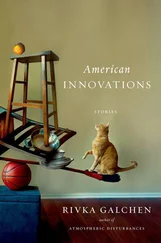I genuinely worried — I’m not sure why — that we were leaving to meet no one.
But at our appointed meeting spot in the central square, a woman was in fact there. Sitting along the edge of a fallow fountain, wearing purple oven-mitt-ish mittens, eating a lime green popsicle, her phosphorescent blonde hair held back with a fleece headband. Did I feel as a Greek tragic hero must feel at the moment of anagnorisis? Not quite. But why shouldn’t that woman have been Rema? Why not her instead of the simulacrum? She had a dog with her, an exceptionally large German shepherd, with dirty snow-colored fur particularly thick and coarse, and I was reminded — so often — of those Austrian dogs that had seemed inexplicably strange, then explicably strange, once I realized they were simply dramatically larger than I was used to, which made being near them feel like being on a movie set with oversized props and doorways extra tall.
The woman bit from her popsicle. A chunklet fell to the ground; the oversized dog snarfed it.
Did I reach my hand into my coat pocket, as if I’d find something there — a swatch of cloth? a lock of hair? an old movie stub? a photograph? a piece of licorice? a special ring? a clipped news article? — something to identify myself to her, something that would prove, across the worlds, that I was really me? I did. But I found only a sugar packet. And a bobby pin that could have belonged to any girl. Nevertheless, I extended my hand to that woman confidently. “I’m Arthur,” I said.
“You’re not Arthur,” she announced in a voice that seemed to me loud enough for the whole universe to hear. Then she laughed. “I’m sorry, I mean, you might be Arthur. But the funny thing is that I’m waiting for someone named Arthur. But an Arthur who isn’t you.”
“Twenty-seven? Ice climber? Bowdoin College?”
She looked at me almost cross-eyed. “You know him?” she said, beckoning her very large dog closer to herself.
“You know him?” I said, thinking about black magic.
“Do you know him?” the simulacrum — so intrusive — was saying to this other woman, intending, I believe, the “him” to be me.
Was this situation terribly disappointing and somewhat humiliating? It was.
Did that woman walk away? She did.
Maybe I expected she would eventually pursue me, but she did not.
Maybe, as Harvey had been alleging, there was a problem with the reality of Tzvi Gal-Chen. Maybe that accounted for the failure of the Hilda encounter. Maybe that accounted for the lack of storms. Messages I wrote to Tzvi simply bounced back. Calls to the Royal Academy failed to connect me to any Tzvi or to any Lola. And a terrible migraine developed within me, as if to counteract the absence of external weather disturbances.
“Let’s go home,” the simulacrum whispered — though it sounded to me like shouting — in my ear, as I lay in bed with the lights out, with the shades down, waiting for my migraine to pass, waiting for Harvey to return from the field with news, even though I had no confidence that he would. “You’ll find yourself so happy to be home,” she continued. “You’ll feel like yourself again at home,” and the feeling inside me was of inhabiting a dark and uncanny fairy tale.
I asked her to please leave me alone. But she said that at my age I shouldn’t be left alone when I wasn’t feeling well. At my age . She said that more than once. I’m barely in my fifties, but she spoke of me like a man on his deathbed. In essence making a deathbed out of that oddly proportioned hotel bed, killing me in her imagination, in a room of false intimacy, with its horse and glacier images. “Most people of my socioeconomic status live quite a bit beyond fifty,” I whispered through the yellowness of my headache. “I will get better. Tzvi will contact us soon enough.”

Later the simulacrum began crying and accusing me more absurdly.
“Of course I love the original Rema,” I murmured, trying to placate her into a shush, feeling a touch awkward about the simulacrum’s excessive investment in my feelings for Rema. She continued heaping unfounded anxieties one atop the other. For a long time I said nothing, but finally I interjected: “No, that’s not what any of this is about at all. That’s not why I don’t want to go home yet.”
Undeterred from her perseverations, she went on saying things that don’t merit transcription, saying that I didn’t find her attractive, repeatedly confounding herself and Rema, lily-padding from irrelevancies to inaccuracies. In a slight ebb tide of my pain, I exhaled the following: “You don’t understand. If anyone is, or was, unfaithful, if anyone is, or was, ‘seeing’ anyone else — maybe seeing many other people — it was her, it was without a doubt her, and it was only her. How many times have I picked up the phone only to have the other person hang up? Rema is very young. She is too young. She probably thought she wanted someone older, and reliable, and financially established; but in the end she didn’t want to be married to a father. I could practically be her father. But I could never be enough of a father and a father is not enough. Maybe no one will ever be enough. Maybe she’s not a person for whom anything will ever suffice. Well, maybe that is understandable, understandable even to me . So she finds someone else, someone younger, maybe. Prettier, maybe. He will disappoint her too. She’ll return. I’m not worried. I have no worries—”
I didn’t actually believe a word of what I said. Even if I did, briefly, that would have been purely on account of my distorting neurologic state. That’s not what Rema’s like. I was just talking. And women, they’re always wanting to take the side of other women, and so somehow the simulacrum had put me in a position where it seemed like I was arguing against Rema, like I was in some way hurting Rema. I wasn’t. I was loving her and I was looking for her. It was not, as the simulacrum kept alleging, that I wasn’t really looking at all, that I was running away. And the truth of the matter was that the matter between us happened not to be the matter between us — that is, whatever problems we actually suffered within our own marriage were absolutely irrelevant to what was currently keeping us apart. “Tzvi understands what’s keeping us apart,” I declared. I didn’t think he fully did, actually, but I wanted to appeal to an authority outside of myself.
Later the phone rang. Not my phone, but hers. She wouldn’t answer it. “It’s just my mom,” she claimed.
“Why don’t you talk to her?” I said, feeling unusually aware of other people’s pain.
“It is difficult. I don’t like it.”
“The poor woman,” I scolded. “Can’t you spare a little kindness? You know what happened to her husband, don’t you?”
“Did she tell you that lie too?” The simulacrum sighed. “He just left her. That’s all. She likes to make it seem something else, something dramatic, but it is very ordinary. She likes to make her pain seem extraordinary when it is just ordinary, ordinary pain for an ordinary, ordinary person.”
I turned on the TV, very quietly, to stop her mean talk.
In my dream she was there, then I awoke and she wasn’t there, then I fell back to sleep and then woke and she was there. She was wearing, in addition to a frumpy alpaca sweater, a small, sad look of triumph.
“Where’s Harvey?” I asked.
“He was called home.”
From among the chaos she carried within Rema’s pale blue purse, she pulled a folded piece of paper. The filmy folded sheet proved a faxed copy, printed in a powder that finger oils could smudge away, of a page from the September 1996 issue of Journal of the Atmospheric Sciences . Blue lint had collected along the fray of the folds and when I unfolded the paper it crackled slightly with what I believe were crumbs of rye cracker. I include the full text of the journal page she presented to me.
Читать дальше
Конец ознакомительного отрывка
Купить книгу













